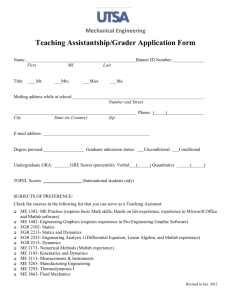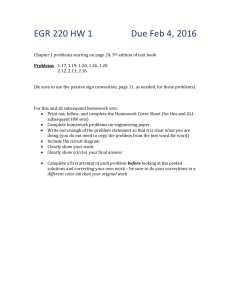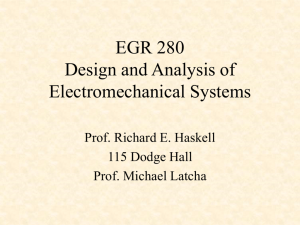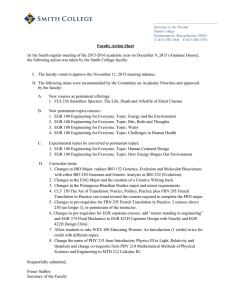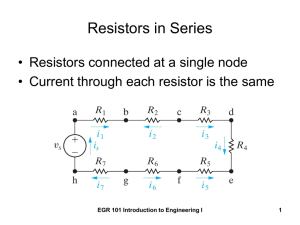Teaching Technical Courses from a Christian Perspective: A Reformed Approach to Pedagogy
advertisement
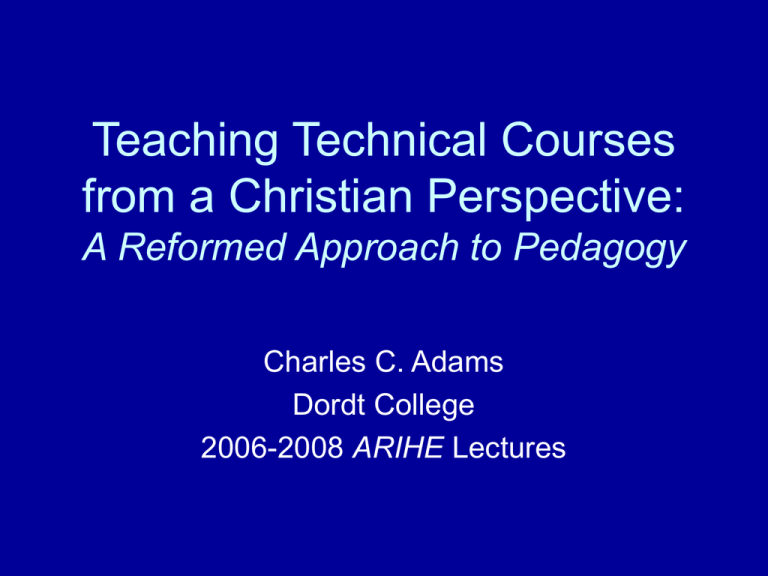
Teaching Technical Courses from a Christian Perspective: A Reformed Approach to Pedagogy Charles C. Adams Dordt College 2006-2008 ARIHE Lectures “As a result of this course and your instructor’s efforts, how has your faith grown and your worldview been shaped in a positive Christian direction? And, specifically, how has your understanding/ appreciation of Christ’s lordship over the particular subject matter of the course been deepened?” The Problem • The nature of “technical” courses: abstraction. • The nature of “non-technical” courses: less abstraction, more holism. • A moralistic solution. A Simple Approach to Teaching Christianly • WHAT? God’s good creation. – The heavens declare the glory of God; the differential equation proclaims the work of his hands. • WHY? Service. – Creatures are servants. – Life is service. • HOW? Pedagogy that respects the created order. But to do that will require us to cultivate a holistic quality in our colleges, our majors, our courses, and, at appropriate times, our lessons. Providing a Holistic Context for Abstraction • At the institutional level – Student Services as part of the overall academic program. – Institutional modeling of holistic Christian behavior. • At the program curricula level – Faculty commitment: word and deed. – The “tapestry” metaphor. Curricular Component Thread Mathematics Physics Biotic (life science) Curricular Threads in the Mechanical Engineering Curriculum Analytic (critical thinking) Cultural formative (design) General Education Aesthetics (the arts) Communication Social Science Ethics Philosophy/Worldview Engineering Science General Engineering Engineering Systems Engineering Design Thermal-Fluid Systems Mechanical Engineering Mechanical Systems Materials & Processing Mechanical Engineering Curriculum – 1998 – Perspectives Thread FIRST SECOND THIRD FOURTH FALL (17.0) ENGL 101 Grammar & Composition (3) EGR 105 Engineering Principles (3) CMSC 102 Programming - Natural Sciences (3) MATH 112 Calculus I (4) CHEM 103 Chemistry I (4) SPRING (17.0) ENGL 200 Literature (3) EGR 101 Engineering Graphics (3) PHYS 201 Physics I Mechanics (4) MATH 113 Calculus II (4) CHEM 104 Chemistry II (4) FALL (17.0) HIST 100 Western Civilization (3) EGR 220 Linear Circuits and Electronics (4) PHYS 202 Physics II: Fluids, Waves, Heat, E&M (4) MATH 203 or MATH 204 (3) COMM 110 Fundamentals of Speaking & Listen. (3) SPRING (16.0) THEO 101 Perspectives in Theology (3) EGR 221 Linear Systems Analysis (4) EGR 299 Thermodynamics I (3) MATH 201 Calculus III (3) EGR 202 Elements of Materials Science (3) FALL (17.0) Foreign Language Elective (3) EGR 204 Microprocessors and Digital Electron. (4) EGR 302 Fluid Mechanics (3) EGR 208 Statics and Strength of Materials (4) Social Science Elective (3) SPRING (17.0) PHIL 201 Perspectives in Philosophy (3) EGR 362 Control Systems (3) EGR 303 Heat Transfer (4) EGR 209 Kinematics and Dynamics (4) EGR 310 History of Science & Technology (3) FALL (16.0) Humanities Elect. (3) GEN 200 Introduction to the Arts (3) Math/Science Elective (3) EGR 315 Machine Design (3) EGR 379 Senior Design (4) SPRING (15.0) Social Science Elective (3) EGR 390 Technology & Society (3) GEN 300 Calling, Task, & Culture (3) EGR 320 or EGR 350 or EGR 351 (3) EGR 380 Senior Design Project (3) Providing a Holistic Context for Abstraction • At the course level – Concepts, laws, and “things” as creatures – Respecting the integrity of students in the course pedagogy – Communicating the context of the subject matter: history of the discipline • An attempt to bring wholeness to a fluid mechanics course Providing a Holistic Context for Abstraction • At the “lesson” or “assignment” level – An occasionally “odd” homework problem: “What is the nature of a pump, in the context of the history of creation-fall-redemption?” – Two answers to an “odd” problem. Providing a Holistic Context for Abstraction • At the “interstitial” level – History: stories about historic characters and events. – Application: stories that provide professional context for the application of concepts – Application: stories that provide personal context for the application of concepts Conclusion • Imagine that you are a Board member… – Hiring a mathematics teacher – Asking the right questions • Two helpful, complementary books – Roy Clouser, The Myth of Religious Neutrality – Duane Litfin, Conceiving the Christian College

